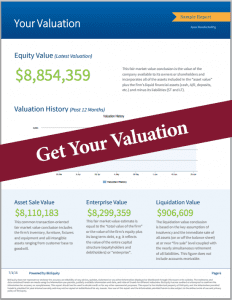Latest posts by Holly Magister, CPA (see all)
- ERC Tax Return Amendment Rules Change - March 25, 2025
- Safe Financial Instruments Guide - December 4, 2024
- New Overtime Rule Increases the Salary Exemption Thresholds - November 19, 2024
 An Earn Out Payment is additional future compensation paid to the owner(s) of a business after it is sold. The terms and conditions that yield an earn out payment are contained in an Earn Out Agreement which is part of the Agreement of Sale. Typically, this payment is dependent on specific terms and conditions being met by the business as it operates in the years following the sale.
In recent years, Earn Out Payments have become very common in Mergers & Acquisitions. Yet many advisors, business sellers, and buyers find the inclusion of an Earn Out Payment Agreement in a deal’s structure problematic. But this does not have to be the case if the seller and buyer align the terms in the Earn Out Payment Agreement with their common post-closing objectives.
An Earn Out Payment is additional future compensation paid to the owner(s) of a business after it is sold. The terms and conditions that yield an earn out payment are contained in an Earn Out Agreement which is part of the Agreement of Sale. Typically, this payment is dependent on specific terms and conditions being met by the business as it operates in the years following the sale.
In recent years, Earn Out Payments have become very common in Mergers & Acquisitions. Yet many advisors, business sellers, and buyers find the inclusion of an Earn Out Payment Agreement in a deal’s structure problematic. But this does not have to be the case if the seller and buyer align the terms in the Earn Out Payment Agreement with their common post-closing objectives.
Why are Earn Out Payments Used?
One reason Earn Out Payments exist is due to a difference or gap between what a buyer is willing to pay the owner of a business and its asking price. An Earn Out Payment can bridge the gap between respective valuations in order to close the sale. Earn Out Agreements also are used when a buyer disagrees with the seller’s projected profitability and expected growth. In this case the company must meet certain profitability expectations in order for the buyer to pay the seller additional compensation. In both cases, it’s important to understand that an Earn Out Payment is not guaranteed to be paid to the business owner unless such a guarantee is specified in the Earn Out Agreement and the agreement’s terms are met.Who Should Consider an Earn Out Agreement?
Earn Out Agreements have become increasingly common in recent years and they are most popular in times of economic and political uncertainty. And while any type of business sale may consider an Earn Out Agreement, they tend to be most popular among private equity investors who may not have the expertise to keep the business running on its own after the purchase. In such cases an Earn Out Agreement may be used to entice the former business owner to remain involved in the business following the sale. Regardless of the type of business, Earn Out Agreements should be considered only when the company will be operated and managed the same in future years as it is at the time of sale. This is the better way to project future performance. But if future plans involve dramatic shifts in operation, an Earn Out Agreement may not make sense, especially for the seller.
What is an Earn Out Payment Formula?
Earn Out Payments may be linked to almost anything to which a willing seller and buyer can agree. Examples of measurements typically found in Earn Out Payment formulas include: Gross Revenue, Gross Profit Margin, EBITDA, Adjusted EBITDA, EBIT, Gross Revenue per Full Time Employee, Employee Retention Rates, Gross Revenue Growth Rates, and more. Typically an Earn Out takes place over a three to five year period following acquisition. Generally, sellers should be cautioned to limit the time frame of the payout since an Earn Out Agreement could defer anywhere from 10 to 50 percent of the purchase price.Limitations and Cautions When Considering an Earn Out Agreement
When considering the terms of an Earn Out Agreement a cautious seller should limit their exposure only to terms over which they have control. Otherwise the fate of the seller’s Earn Out Payment could fall into the hands of the buyer or other parties after the closing. For example, an Earn Out Payment tied to profitability of the business after the sale would be unwise unless the seller remained in management control. Even if the seller retains full management control after the business is sold, this type of Earn Out Payment measurement may not be ideal. The buyer may worry the seller could understate expenses or overstate revenue to ensure the future payout. Conversely a seller may worry the company could be purposefully mismanaged in an effort to miss the performance targets required for additional compensation to be paid to the seller. Nevertheless, it’s always best practice to tie the Earn Out Payment formula to a measurement or metric which will be within the seller’s control after the sale of the business.Who Should Negotiate the Earn Out Agreement Terms When Selling a Business
To avoid potential conflicts after the closing, the buyer and seller should make certain their respective representatives have a thorough understanding of the business’s operations and its cash flow. While it’s not uncommon for the business broker or M&A Intermediary to negotiate on behalf of their respective clients, these advisors generally do not have a deep understanding of the seller’s business. Likewise, the seller’s attorneys know much about transaction law, but typically don’t understand the selling business’s finances. Accordingly, it’s best to consider assigning the negotiation of the terms and conditions of the Earn Out Payment to the business owner and his or her Chief Financial Officer. While Earn Outs certainly can offer peace of mind and fair value to both the buyer and the seller, they require extra time to negotiate, draft, and implement, and they could result in a lost sale or extra costs for the buyer or seller, including litigation and auditing.
That’s why it’s always best practice to enlist the services of an attorney with extensive experience creating well-reasoned and legally binding Earn Out Agreements which make sense for both the buyer and the seller.
While Earn Outs certainly can offer peace of mind and fair value to both the buyer and the seller, they require extra time to negotiate, draft, and implement, and they could result in a lost sale or extra costs for the buyer or seller, including litigation and auditing.
That’s why it’s always best practice to enlist the services of an attorney with extensive experience creating well-reasoned and legally binding Earn Out Agreements which make sense for both the buyer and the seller.Click to rate this post!
Total Votes: 28 Average Rating: 4.8
Summary

Article Name
What is an Earn Out Payment?
DescriptionAn Earn Out Payment is additional future compensation paid to the owner of a business after it is sold, defined in the Agreement of Sale. Typically, this payment is dependent on terms and conditions being met by the business in the years following the sale.
Author
Holly Magister, CPA, CFP
ExitPromise.com
Exit Promise













How long after the term period closes on an earnout (e.g. 3/31/2021) does it take to calculate and paid out? Does it take a couple of months, typically?
David: There is no legally mandated time period. It is whatever is in your written earn-out agreement. However, it does take time for accountants to accurately review the records.
How common are earn outs in deals right now?
I am thinking about selling my business because everyone is telling me the market for sellers is really great right now. I don’t want an earn out though. I am ready to retire and move on with my life.
Hi Alan,
In my experience, earn out payments in transactions are common when a business owner believes the business is worth more than the amount offered by a buyer for his/her business.
When there is a disparity between the offer and asking price and a seller is willing to assume part of the risk for the business’ future retention/growth in revenue and/or profit, most buyers and sellers will consider including an earn out provision in the deal. Earn outs reduce the risk for a buyer that they may pay more for a business than it’s truly worth.
If you truly want to retire and sell your business Alan, it’s wise to keep an open mind regarding the deal structure. Earn outs are not necessarily a bad deal term… Lean on your advisors to help you negotiate an earn out agreement and other important deal terms to protect you after the sale of your business.
Does this help?
I’m selling my late-husband’s business and several buyers have told me they won’t agree to pay me 100% of the agreed purchase price at closing. Instead they want to pay me part of the price over three years.
One said he’d pay me over four years and he called it an earn out.
Why would he call it an earn out?
Hi Sonya,
The buyer may be unfamiliar with the difference between an installment agreement and an earn out agreement.
Installment agreements are a form of financing for a buyer. If the buyer is not able to bring all of the cash or lender financing to the closing table, he or she may ask the seller to provide part of the purchase price in the form of an installment agreement.
Whereas an earn out agreement is typically negotiated to bridge the gap when there is a difference in opinion regarding the value of the business for sale and/or the buyer would like to find a way for the seller to remain committed or interested in the continued growth and success of the business after the sale.
Installment agreements should provide the seller with a guarantee of payment and include a reasonable market rate of interest income too.
Earn out agreements are not guaranteed to be paid to a seller and should be carefully drafted.
Hope this clears up any confusion. All the best…
Can you please tell me what are the terms of an earn-out clause?
If a business broker is involved in the deal, how does an earn out effect his compensation?
I am looking at an owner desperate to get rid of his business so he can be with family over seas. He has over staffed the company to allow for him to be absentee and is providing no leadership. I want to preserve working capital to fix his mess and in exchange for a MUCH lower price, I will offer earn out payments of a percentage of net cash flow.
Would a broker complicate this deal? Are there any legal and ethical ways around any obstacles a broker would put up?
Hi CBT,
When a business broker (or intermediary) is engaged by a seller to represent him in the sale of his business, a written engagement agreement is typically used. This agreement spells out how much and when the business broker is paid. In most cases, the business broker gets paid only when the seller is paid. That’s not always the case as each broker’s agreement is negotiable.
A reputable business broker will do all he or she can to ensure their clients receive the maximum amount of cash after taxes are paid for the sale of their business. That said, it is possible a business broker may view an earn out payment as a negative if he or she must wait to receive part of his compensation via delayed earn out payments.
If you’ve got a good relationship with the seller and business broker, consider just asking them how the broker will be paid and how your proposed earn out will impact the deal. What they tell you may help you negotiate a good deal — and a fair deal for all parties.
Good luck with your acquisition!
The term earn out – what does it mean to me as an employee of the business to be acquired? Does TUPE apply? Many thanks
Sue, this is just to confirm that, yes, TUPE will apply. For purposes of TUPE it doesn’t matter in the slightest how the vendor is being paid or how the deal is structured. You will have full TUPE protection if your employer is acquired.
Hi Sue,
If the business you work for has been sold to a new owner and an earn out provision was built into the purchase agreement, the business owners will be receive some of their payment for the business sale if certain things happen. It’s not truly possible to tell you what things must happen for your the former business owner to receive his or her full earn out payment. Every earn out agreement is different.
If the new owner and former business owner worked to develop an earn out agreement that ultimately would be beneficial to both parties, then I would be willing to bet the earn out payments are based on future business growth and net income. As an employee, such a scenario should be beneficial as well. Working for a growing business that is profitable is always a good opportunity.
As for TUPE, such regulations apply to employees of businesses in the UK. I am sorry I am not familiar with its applicability in the context of an earn out agreement.
All the best…
Earnouts seem to be the way to go. I believe it is beneficial for both sides of the sale and the customers. I was wondering about tax treatment. From what I understand, based on facts and circumstances, an earnout payment can be considered compensation to the seller or simply a payment on the purchasing of goodwill.
In the situation I am wondering about, the earnout would be considered compensation. My issue is can the earnout be paid to the selling ‘S’ Corp assuming benchmarks are reached? Can the owner of the ‘S’ Corp also be an employee and earn compensation as strictly a worker not related to reaching the benchmarks?
Basically, can the earnout work done by the individual (acting as a representative for the ‘S’ Corp) be reported differently than the wages received for employee-level work?
Thank you.
Hi Bryan,
I’d like to clarify a few of your statements to be certain you understand the various ways an Earn Out Payment in a Purchase Agreement could work.
An Earnout Payment is treated for tax purposes by the buyer and seller based on its underlying form. And the underlying form depends on the type of purchase agreement the buyer and seller chose and how the earn out payments are defined.
A business either sells its assets (under an Asset Purchase Agreement — APA) or its stock (under a Stock Purchase Agreement — SPA). The tax treatment for both the buyer and seller is vastly different for an APA versus an SPA. Based on the way you presented your question, it appears to me you are considering the sale of your business under an Asset Purchase Agreement. The following information addresses this situation:
If your Asset Purchase Agreement calls for part of the purchase price to be paid to the seller as part of purchase price of the business’ underlying assets, then the tax treatment for the buyer and seller follow those tax rules. Essentially, the assets being sold are purchased for a specific price by the buyer. The buyer uses this purchase price as the tax basis for book and amortization / depreciation purposes after the business is acquired. As the seller, your corporation would report the sale of these assets and after recovering the tax basis report a short or long term capital gain on its tax return.
If your Asset Purchase Agreement calls for part of the purchase price to be paid to the seller in the form of an earn out only if certain benchmarks are met, the earn out agreement should specify if the former business owner (you) is to receive the payments directly or if the seller (the S Corporation in the case of an Asset Purchase Agreement) is to receive the payments. This is a very important distinction. Remember, in an APA, the (S) corporation is selling assets not stock. This means the corporation still exists after the sale of its assets.
Okay, with that background I believe I can answer your questions…
It sounds to me that your buyer has proposed paying an earnout to you in the form of compensation. This is tax advantageous to the buyer because they can pay you with a payroll check and deduct all of the earnout and its related payroll taxes as an ordinary business expense. This is more costly to the former business owner (you) because it is ordinary income subject to payroll taxes.
The answer to your first question is ‘yes’. You could require the APA to define the earnout payment to be paid directly to your S Corporation instead of you directly.
The answer to your second question is also ‘yes’. The S Corporation would need to remain open after the sale of the business to receive its earn out payments (if the benchmarks are met) and continue to employ you (the former business owner).
The answer to your third question is ‘it depends’. Compensation is compensation in the eyes of the IRS. If an employee (you) is being paid wages/salaries, it is W-2 income. There’s no distinction in the eyes of the IRS between the type of work an employee does to earn his or her income. The contingency nature of the earnout payment to the former business owner means nothing.
So here’s the ‘it depends’ part. If your buyer agrees to pay the earnout to your S Corp, it’s up to the S Corp to determine the form of payment to be made to the S Corp shareholder and its employees.
The point of contention with the buyer will be how the earn out payment is to be made. If they agree to pay it directly to the S Corp and not to the business owner as compensation, you have flexibility.
Please don’t try this at home! This is where the advice of a CPA who is familiar with business sale transactions is vitally important!
I hope I’ve laid out a few good points for you to address with your CPA and Attorney and I wish you all the best Bryan… Do let us know how it works out for you. We’d love to hear about your business sale.